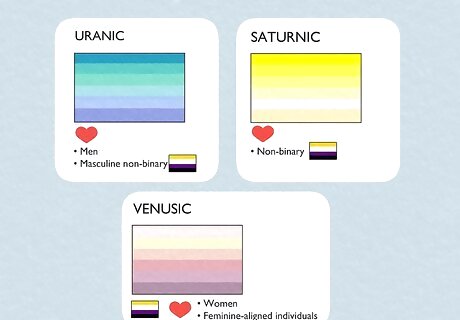
views
- Neptunic is a sexuality where you are attracted to women, non-binary people, or anyone who doesn’t identify as a man.
- Many people who identify as neptunic also identify as non-binary; however, any gender can use this label to describe their sexual orientation.
- Similar micro-labels include uranic, the opposite of neptunic, which refers to an attraction to anyone except women or woman-aligned non-binary people.
What does neptunic sexuality mean?

Neptunic sexuality is the attraction to women and non-binary people. Others define neptunic as the attraction to anyone who doesn’t identify as male or non-binary people who are male aligned. You don’t have to be any specific gender to use this label—you can be a non-binary man, a cisgender woman, or identify as a man and still identify as neptunic. The term "neptunic" probably originated online, and Tumblr user @socialjusticeichigo is often credited with coining this term back in August 2017. Neptunic can be used as a sexuality on its own or it can be combined with other orientations. Some people also call the neptunic identity nomascsexuality.
Neptunic Pride Flag

The neptunic pride flag has six stripes in blue, green, and purple. This flag was created by Tumblr user @socialjusticeichigo, and it’s caught on more and more since then. Some believe that the purple represents androgyny and the blending of gender identities, while others believe that the colors come from the real colors of the planet Neptune. An alternate neptunic flag has the planet Neptune over the top of the original flag. Some believe that the dark blue in the Neptune drawing represents the depth and complexity of non-binary and gender-queer identities. Although there isn’t an official Neptunic Day during Pride Month, some people have designated June 24th as Neptunic Pride Day.
Are you neptunic?

You might identify as neptunic if you feel like the label describes you. Micro-labels like neptunic are real and valid. Not everyone fits neatly into traditional sexual orientation categories like gay, lesbian, or bisexual, and there’s no right or wrong way to identify. You also don’t have to pick a label, and you are totally free to explore other labels later. Here are questions to ask yourself if you’re considering using the neptunic label: Do I feel attraction towards women and non-men? Do I feel attraction towards male-aligned or men-identifying people? Are there other labels that might describe me better, like bisexual or sapphic? If you answered “yes,” to the first question and “no” to the others, then the neptunic label might be for you! You’re also free to use neptunic alongside other labels.
Neptunic Sexuality: Similar Orientation Labels

Lesbian Lesbian usually refers to women-identifying people who have a sexual and/or romantic attraction towards women. However, some non-binary people also identify as lesbians. Some women who are attracted to women might prefer to identify as gay or WLW (women loving women) instead. While non-men and people who identify as women and are attracted to women mainly use lesbian as a label, neptunic is gender neutral and means the attraction to anyone except men and men-aligned people.

Bisexual Bisexual refers to people who experience attraction to more than one gender. Some argue that bisexuality reinforces the gender binary because “bi” comes from the Greek root for “two,” but many people argue that the definition has changed to include the attraction to non-binary and otherwise genderqueer individuals. Because bisexuality is the attraction to more than one gender, neptunic people might also identify as bisexual. Pansexuality, on the other hand, commonly refers to the attraction to all genders. Using this definition, neptunic people can’t be pansexual because they aren’t attracted to men.

WLW WLW (Women Loving Women) refers to lesbian, bisexual, or pansexual people who identify as women and are attracted to women. This label can apply to woman-aligned non-binary people, cisgender women, and transgender women who feel attraction towards other woman-aligned non-binary people, cisgender women, and transgender women. While you don’t have to be a specific gender to identify as neptunic, WLW specifically refers to people who identify as women. So, you can identify as WLW and neptunic, but you can also be neptunic and not identify with the WLW label.

Uranic, Saturnic, and Venusic Neptunic is not the only planet-named sexuality made for non-binary individuals! Some people might identify as uranic, saturnic, or venusic instead of identifying as neptunic. Here’s what each of them mean: Uranic, named after the planet Uranus, is a sexuality that refers to an attraction to anyone except women or woman-aligned non-binary people. Saturnic, named after the planet Saturn, is a sexuality that refers to the attraction to only non-binary people, including those who are woman-aligned and/or man-aligned. Venusic, named after the planet Venus, is a sexuality that refers to the attraction to only non-binary people who are femme or women-aligned.

Trixic or Trixensexual Trixic, or orbisian, refers to non-binary individuals who are non-exclusively or exclusively attracted to women and women-aligned people. Trixensexual, or trixenamoric, refers to people of any gender who are exclusively attracted to women and non-binary people. Those who identify as neptunic can identify as any gender, while trixic refers only to non-binary people. Those who identify as trixic might also not exclude men and male-aligned people, while those who identify as neptunic generally do. The man and non-binary equivalent of trixensexual is torensexual.
Neptunic Sexuality: How to Be an Ally

Educate yourself on LGBTQ+ terms and issues. Staying informed on LGBTQ+ related news and issues, reading about different terms and labels (like you’re doing right now), and learning some key concepts, like the difference between sex, gender identity, and sexual orientation, are great ways to stay informed about the LGBTQ+ community. While sex is the genetic and physical characteristics you were born with, gender is a social and cultural expression. For example, male facial hair and genitalia is a part of sex, while using he/him pronouns and dressing in traditionally masculine clothing is a part of gender. If a person says they identify with a label you haven’t heard of, you can always politely ask the person what it means or try to research more about it later.

Be supportive and allow LGBTQ+ people to come out on their own terms. If someone you love comes out to you as LGBTQ+, thank them for having the courage to tell you and tell them that you still care about them no matter what. You can ask questions, but allow them the integrity to share their sexuality or gender identity to whoever they want, when and how they want to. You can also offer and be available to support your loved one when they come out to others.

Validate a person’s orientation or gender identity when they come out. One of the best ways to validate a person’s sexual orientation or gender identity is to hear them out and let them know you’re here to listen. If they want to use a different name or set of pronouns, try to refer to them by that name or pronoun and correct yourself when you use the wrong one. Respect someone’s pronouns by asking people what their pronouns are when you meet them and giving them your own.

Call out prejudice and discrimination towards the LGBTQ+ community. If someone says a derogatory word or something otherwise offensive about someone LGBTQ+, let them know that their words are not acceptable and educate them on the right words to use instead. At work, school, or in the government, support policies that protect LGBTQ+ people from discrimination. Coming out as an ally or joining a support group like PFLAG can also help you show your support of the LGBTQ+ community.




















Comments
0 comment